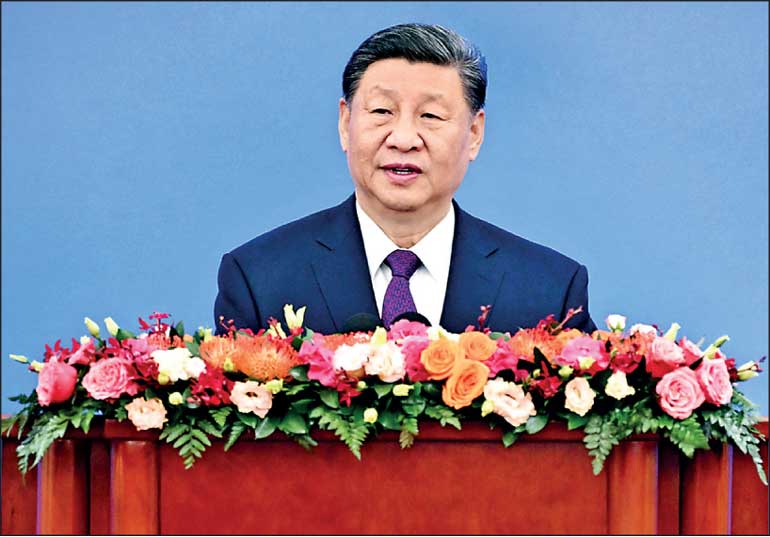Friday Feb 20, 2026
Friday Feb 20, 2026
Saturday, 6 July 2024 00:10 - - {{hitsCtrl.values.hits}}

Chinese President Xi Jinping
 Seven decades ago, the late Chinese Premier Zhou Enlai first put forward the Five Principles of Peaceful Coexistence namely mutual respect for sovereignty and territorial integrity, mutual nonaggression, mutual noninterference in each other’s internal affairs, equality and mutual benefit, and peaceful coexistence.
Seven decades ago, the late Chinese Premier Zhou Enlai first put forward the Five Principles of Peaceful Coexistence namely mutual respect for sovereignty and territorial integrity, mutual nonaggression, mutual noninterference in each other’s internal affairs, equality and mutual benefit, and peaceful coexistence.
On 28 June 2024, China proudly commemorated its 70th anniversary for successfully carrying forward these principles, which has been seen by the world as an inevitable historic development and milestone of the new world of international relations.
Chinese President Xi Jinping delivered an important speech at the conference. During the address, President Xi said that “Five Principles of Peaceful Coexistence have become open, inclusive, and universally applicable basic norms for international relations and fundamental principles of international law. They have made indelible historic contributions to the cause of human progress.”
“At this historic moment when mankind has to choose between peace and war, prosperity and recession, unity and confrontation, we must champion more than ever the essence of the five principles of peaceful coexistence,” said President Xi.
During the speech, President Xi also announced several measures to support China’s cooperation with the Global South nations, including establishing a Global South research centre, 1,000 scholarships under the Five Principles of Peaceful Coexistence Scholarship of Excellence, and 100,000 training opportunities to Global South countries in the coming five years, as well as launching a youth leaders’ program.
The Global South sees this as a relevant and important norm governing contemporary international relations and recognises it as a strength to make collective voice louder for improving global governance.
Even though the Five Principles of Peaceful Coexistence has been written into China’s Constitution long before, introduction of this to the world has been viewed as another important public good that China provided for the world. The Five Principles provide a whole set of basic norms for peaceful coexistence among countries across political, security, economic and diplomatic domains. They constitute an unequivocal and effective code of conduct for all countries to follow in promoting the spirit of international rule of law and finding the right way to get along with each other.
The main aim of these principles is to build a community with a shared future for mankind and provide a strong driving force for human progress. They are the bedrock of China’s independent foreign policy of peace and act as an important tenet for international relations today what we are witnessing.
Contradictory to the United States and its closest Western allies, China uninvolved in lecturing other counties, instead the new China followed this principle of independence, actively sought peaceful coexistence with all countries, and endeavoured to improve its external environment, especially in its neighbourhood. Evidently, since the founding of the new China, China has never provoked any war and never occupied an inch of another country’s territory and never sought hegemony on the basis of strength.
However, the US and its Western allies have long influenced the world order with their own values and policies in the name of promoting “democracy” and “defending” human rights and have launched smear campaigns against countries whose political systems are different from theirs. And disrespect the development paths and systems of other countries independently chosen by people of the countries.
They even bully emerging markets and developing countries, forcing them to take sides in disputes with countries that don’t adhere to the Western-centric ideology and politics. The US has been engaged in several military conflicts since its birth just for its own benefits.
Therefore, the Global South wanted to have a multipolar world that promotes a more just and equitable international order and creation of the partner country model. The Global South demand for the international rules to be made and observed by all countries and world affairs should be handled through extensive consultation. Ultimately the Global South wanted an equal and orderly multipolar world, one that is not dominated by the US and other members of the West. An equal and orderly multipolar world means every country can find its place in a multipolar system and play its due role pursuant to international law.
The five principles help the Global South to form a coalition as a collective force to gain strength through unity that can give a more impactful voice on the global stage to achieve. That is the reason for countries across the world widely accepting and recognising the five principles. Because the Global South knows that without a stronger voice and representation of developing countries on the global stage, there is no way to achieve prosperity even though the world is big enough to accommodate the common development and common progress of all countries.
It is fair for countries to seek to change it to their own advantage and demand control of their resources. The Global South has increased its appeal as a source of inspiration and committed to openness, inclusiveness and win-win cooperation and ready to find a meaningful solution through dialogue and consultation offer a new blueprint for global development.
China has been advocating a universally beneficial and inclusive economic globalisation. China’s goal is to benefit all with the opportunity of development, to diversify development paths, to help all nations share development fruits, and to encourage common development and prosperity for all countries in the global village. This is exactly the Global South is dreaming for.
The Five Principles of Peaceful Coexistence with the President Xi proposed Global Development Initiative, the Global Security Initiative, and the Global Civilization Initiative also aim to serve as strategic guidance for the new world order and redefine the current US-led liberal international order which has allowed the US to flourish and remain first.
Now the Global South is demanding for immediate reform in the current system, which is unfair and disproportionate. Otherwise, the Global South will take the lead in the global governance which is acceptable to all. Whether like or not, the US and its Western allies must listen to the Global South concerns, and prepare to include all in global governance, increasing the voice and representation of developing countries and reform the financial architecture which can benefit all.
(The writer currently serves as a Director of BRISL, an independent and pioneering Sri Lankan-led organisation, with strong expertise in BRI advice and support. Maya can be contacted at: [email protected].)